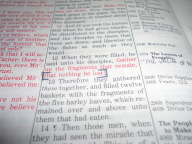In 1964, a priest, Father Rick Thomas, was appointed to a parish near El Paso Texas. This was around the time that the “Catholic Charismatic Renewal” movement was beginning to gain in popularity. Around 1969/1970 he was profoundly touched by God and started charismatic prayer meetings in the parish which. The meetings were were co-led by religious Sister Maria Virginia, a Sister of the Daughters of Charity.
Inspired by scripture passage Luke 14:12-14, they invited the local neighborhood poor in order to provide Christmas turkeys in the nearby Mexican town of Juarez. Unfortunately the food service delivered hams instead. So enough ham was prepared for 125 people. but over 350 showed up. Looking at Fr. Thomas for direction,he instructed them to carve and provide as much as was available. They never ran out of food and everyone was fed and there. This first miracle of Christmas Day 1972 was followed by subsequent, similar miracles which occurred frequently to the point that in 1982, Father Rick Thomas documented them in his book - Miracles In El Paso?
In considering today’s reading about the miracle of the loaves and fish, one could surmise that Jesus could have arranged to have exactly the right amount of food for everyone present. But they had more than they wanted; more than they needed. “Fragments” we’re left over.
What’s the significance of the fragments? Why did Jesus order the fragments to be collected? What did they do with the fragments? In considering these questions, there are biblical insights and then practical and pastoral implications.
1. The literal translation of the word used here, fragments, is “broken pieces.” Fragments were gathered by those who were, themselves, fragmented and broken.
Application:We are treasures in earthen vessels. God uses the weak and the broken to accomplish his greatest works. God also often utilizes us when we are at our worst to accomplish His best works.
2. In the story, nothing was wasted; nothing was discarded; nothing was lost. = no one is wasted; no one person is lost; no one person is discarded.
Application: No one person is ever wasted in this world. Every single person was created on purpose - FOR a purpose; no one person is lost; no one person is to be discarded.
Application: No personal experience of ours is ever wasted, lost, discarded, insignificant. As St. Paul relates in II Corinthians, God takes everything of our lives, changes, it, transforms, it redeems it for the benefit of another to whom we can relate and offer consolation since we went through the same trouble as they are experiencing.
3. The bounty of God’s providence is not to be squandered. Jesus knew that people had baskets with them. Baskets were the purses, backpacks and shopping bags of Jesus’ day. The fragments were gathered so that extra food could be provided for others who were not around.
Application: We who are also broken and fragmented, are to take what we have received from God and take it to the others who are, likewise, broken and fragmented.
4. This provided an evangelization component. The story of the fragments proved the miracle and provided people an opportunity to relate the story to others who were not there.
Application: Small gestures on our part might be miracles that have a hugh impact in someone else’s life. This is one definition of a “vocation” which is where your greatest passion, greatest interest or greatest talent intersects God’s greatest need.
5. There is an element of “a call from God” here as well. Jesus did His part; the Disciples had to do their part as well.
Application: Reason for the “organized church” and a counter to the oft heard, “I’m spiritual but not religious. I don’t believe in an institutional church.”
- You cannot attain nirvana and be done. Peace can not actually be achieved there.
- No human being can be fulfilled and remain by them self and be centered totally on them self. We are made for community. We are made to reach out to, connect with, and bless others.
Audio version of the homily is here:
